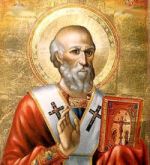Catholic World News News Feature
Pope Benedict: the meaning of 'apostolate' September 10, 2008
During his public audience on Wednesday, September 10, Pope Benedict XVI explained why St. Paul is commonly called "the Apostle."
"The title of Apostle is not, and cannot be, a merely honorary title," the Holy Father said. St. Paul, in his epistles, explained that he was able to consider himself an apostle for three reasons: he had encountered Jesus personally, he was sent by Christ upon a mission, and he had dedicated himself to spreading the Gospel.
The word 'apostle" comes from the Greek term for an envoy, Pope Benedict reminded his audience. By nature an apostle is someone who has been appointed. "Apostles do not make themselves but are created so by the Lord," he said.
St. Paul wrote that he was acting as a servant of God, and all his success was a function of God's grace. The Word of God had its own power, the Apostle said, and he was its instrument. This is a typical expression of true apostolate, the Pope said: "a form of identification between the Gospel and the evangelizer."
This confidence in the efficacy of the Gospel did not mean that St. Paul would always be successful, the Pope continued. On the contrary, St. Paul recognized that the Gospel would be "a stumbling block" to many who heard it. "That happened then, and it should be no surprise that the same thing happens today," Pope Benedict reflected.
St. Paul persevered nevertheless, the Pope pointed out, confident that his faithfulness was its own reward because "nothing can separate us from the love of God, and this love is the real treasure of human life." The Pope concluded his audience by encouraging all the faithful to imitate this attitude, and be "collaborators of true joy" by spreading the Gospel.






